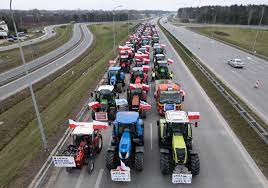EU eyes easing green rules on farmers to defuse protests

Brussels: The European Commission has proposed an easing of a series of rules on leaving land fallow or rotating crops, offering concessions to farmers who have protested with tractor blockades across Europe over the past few months.
The European Union executive said it was sending its proposals to the 27 EU member governments and the European Parliament to reflect on how to improve the position of farmers in the food supply chain.
It said the list of possible actions would be discussed by national agriculture ministers, who are next due to convene in Brussels on March 26.
EU Agriculture Commissioner Janusz Wojciechowski had been due to present the reforms on a visit to his native Poland earlier on Friday, but said this was delayed due to a dispute over the timing of some changes.
Polish farmers have been among those that have staged weeks of protest across the EU to press a series of demands, including removing restrictions placed on them by the EU’s Green Deal plan to tackle climate change, as they say they cannot afford them.
Poland’s farmers have a particular grievance because of increased competition from neighbouring non-EU Ukraine’s farmers, who they accuse of flooding EU markets with cheap imports that leave them unable to compete.
Commission proposals concentrate on offering farmers more flexibility in heeding mainly environmental rules, such as to protect peat land, limit water pollution and soil erosion, while continuing to benefit from EU agriculture fund payments.
For example, farmers will be able to get more financial support for keeping a share of their land non-productive, such as with hedges or trees, to improve biodiversity.
Farmers could carry out crop diversification, rather than crop rotation. Certain crop types could also be exempt from rules on tillage, soil cover or rotation.
In addition, exemptions could be granted in cases of adverse weather, while small farms of below 10 hectares (25 acres) would not have to be subject to controls or penalties.
Wojciechowski has faced calls to resign from all sides of the political spectrum in Poland, with farmers blaming him for the policies they oppose.
The European Commission is especially anxious to quell opposition from farmers ahead of European Parliament elections in June in which the far right, for whom farmers represent a growing constituency, is expected to make gains.
It has already set curbs on imports of Ukrainian farm products, allowed some exemptions to land needing to be left fallow, and also scrapped a plan to halve pesticide use.





